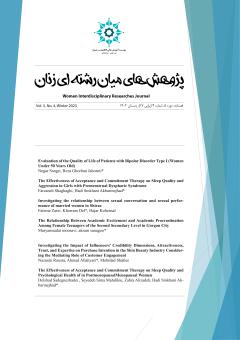The Relationship Between Academic Excitement and Academic Procrastination Among Female Teenagers of the Second Secondary Level in Gorgan City
Subject Areas :
Maryam sadat Moosavi
1
![]() ,
akram sanagoo
2
*
,
akram sanagoo
2
*
![]()
1 - Gorgan branch, Islamic Azad University, Gorgan, Iran.
2 - Associate Professor, Department of Nursing, Faculty of Nursing and Midwifery, Golestan University of Medical Sciences, Gorgan, Iran.
Keywords: Academic procrastination, Academic excitement, Students, Girl, Second secondary school.,
Abstract :
The purpose of this research was to predict academic procrastination through the academic emotions of the second high school female students. This research was applied in terms of purpose and descriptive in terms of correlational data collection. The statistical population of the present study includes all female students of the second secondary level of Gorgan city in the academic year of 2011-2012, whose number was 4501. According to Morgan's table, the number of samples equal to 354 female students of the second secondary level were selected using available sampling. The research tool in this study was a standard questionnaire, which was used for procrastination from Sawari's academic procrastination questionnaire, and for measuring academic emotions, Pakran et al.'s questionnaire was used. After collecting and extracting the data, the scores of the participants were analyzed using Pearson's correlation method and then multivariate regression analysis using SPSS-27 software. The results of the correlation coefficient between the research variables were significant. The results show that the regression model using the simultaneous method (Enter) variables of positive emotions (β=0.463), negative emotions (β=0.131), and academic emotions (β=0.117) are significant predictors of procrastination. are academic work (P>0.001). The research showed that the variables of positive emotions, negative emotions, and academic emotions are significant predictors of academic procrastination.
1- حسینی، فریده؛ و خیّر، محمد(1390). نقش ارزیابی شناختی در تبیین رابطه ابعاد فرزند پروری با هیجانات تحصیلی ریاضی و تنظیم هیجانی. مطالعات آموزش و یادگیری، 3(1)، 17-46. dor: 10.22099/JSLI.2011.214
2- خاوند، معصومه(1400). رابطه نشاط ذهنی با خودکارآمدی و اشتیاق تحصیلی دانش آموزان. اولین کنفرانس بینالمللی علوم تربیتی، روانشناسی، علوم ورزشی و تربیتبدنی، ساری.
3- رحمتی، ندا؛ ابوالمعالی الحسنی، خدیجه؛ و میرهاشمی، مالک(1402). عوامل مؤثر بر هیجان تحصیلی دانش آموزان دختر دوره متوسطه اول: یک مطالعه کیفی. رویش روانشناسی، 12(4)، 85-94. dor: 20.1001.1.2383353.1402.12.4.9.9
4- مرادیان، جلال؛ عالیپور، سیروس؛ و زغیبی قناد، سیمین(1396). رابطه هیجان¬های تحصیلی با رویکردهای مطالعه و اهمالکاری تحصیلی در دانشجویان، پیشرفت¬های نوین در علوم رفتاری، 2(3)، 1-13.
5- سرائی، رضا؛ و یوسفی، فاطمه(1402). مدل علّی پیشبینی اهمالکاری تحصیلی بر اساس ریشههای والدینی و مؤلفههای خودناهمخوانی با نقش واسطهای احساس تعلق به مدرسه. فرهنگ مشاوره و رواندرمانی، 14(55)، 91-124. doi:10.22054/qccpc.2023.69624.2998
6- شیوندی چلیچه، کامران؛ درتاج، فریبرز؛ فرخی، نورعلی؛ و ابراهیمی قوام، صغری(1396). مدل¬یابی پیشرفت تحصیلی ریاضی برمبنای ارزش تکلیف، درگیری شناختی، هیجان¬های پیشرفت و خودنظم-جویی تحصیلی. فصلنامه فرهنگ مشاوره و رواندرمانی، 8(30)، 1-24.
7- قاسمی، آزاده(1401). پیش¬بینی اهمال¬کاری تحصیلی بر اساس اعتیاد به تلفن همراه و کمال¬گرایی. پایاننامه کارشناسی ارشد موسسه آموزش عالی فاطمیه شیراز.
8- قیصری، فاطمه؛ و شیرازی، محمود(1400). نقش راهبردهای تنظیم شناختی هیجان بر اضطراب کرونا، سلامت روان و انگیزش تحصیلی دانشجویان در دوران همهگیری کرونا. اولین کنفرانس بینالمللی علوم تربیتی، روانشناسی، علوم ورزشی و تربیتبدنی، ساری.
9- کمالی، نازنین(1396). رابطه اهمالکاری تحصیلی و خودپنداره با انگیزش پیشرفت در دانشجویان دانشگاه آزاد اسلامی واحد تهران مرکزی. اولین همایش بینالمللی و سومین همایش ملی پژوهشهای مدیریت و علوم انسانی.
10- محمدی، نسرین؛ و مهاجران، بهناز(1400). تأثیر برنامه آموزشی خودتنظیمی بر تنظیم شناخت هیجان و درگیری تحصیلی در میان دانش آموزان دختر دوره دوم متوسطه شهر تکاب. هفتمین کنفرانس ملی مطالعات مدیریت در علوم انسانی، تهران.
11- مؤمنی مهموئی، حسین؛ و جلالی بارزاری، سعید(1395) رابطه خوشبینی تحصیلی معلمان با ادراک حمایت اجتماعی، انگیزه پیشرفت و عملکرد تحصیلی دانش آموزان. رهیافتی نو در مدیریت آموزشی، 7(2)، 181-199. dor: 20.1001.1.20086369.1395.7.26.10.1
12- Ferrari, J. R. (1991). Compulsive procrastination: Some self-reported characteristics. Psychological reports, 68(2), 455-458. doi:10.2466/pr0.1991.68.2.455
13- Ferrari, J. R., & Díaz-Morales, J. F. (2007). Perceptions of self-concept and self-presentation by procrastinators: Further evidence. The Spanish journal of psychology, 10(1), 91-96. doi:10.1017/S113874160000634X
14- Hailikari, T., Katajavuori, N., & Asikainen, H. (2021). Understanding procrastination: A case of a study skills course. Social Psychology of Education, 24(2), 589-606. doi:10.1007/s11218-021-09621-2
15- He, S. (2017). A multivariate investigation into academic procrastination of university students. Open Journal of Social Sciences, 5(10), 12. doi:10.4236/jss.2017.510002
16- Liu, Y., Carney, J. V., Kim, H., Hazler, R. J., & Guo, X. (2020). Victimization and students’ psychological well-being: The mediating roles of hope and school connectedness. Children and Youth Services Review, 108, 104674. doi:10.1016/j.childyouth.2019.104674
17- Moon, S. M., & Illingworth, A. J. (2005). Exploring the dynamic nature of procrastination: A latent growth curve analysis of academic procrastination. Personality and Individual differences, 38(2), 297-309. doi:10.1016/j.paid.2004.04.009
18- Pekrun, R., Goetz, T., Titz, W., & Perry, R. P. (2002). Academic emotions in students' self-regulated learning and achievement: A program of qualitative and quantitative research. Educational psychologist, 37(2), 91-105. doi:10.1207/S15326985EP3702_4
19- Putwain, D. W., Becker, S., Symes, W., & Pekrun, R. (2018). Reciprocal relations between students’ academic enjoyment, boredom, and achievement over time. Learning and Instruction, 54, 73-81. doi:10.1016/j.learninstruc.2017.08.004
20- Sakpireeva, G., & Baymuratova, K. (2020). PROCRASTINATION: A SCIENTIFIC GUIDE ON HOW TO STOP PROCRASTINATING. In МОЛОДОЙ ИССЛЕДОВАТЕЛЬ: ВЫЗОВЫ И ПЕРСПЕКТИВЫ (pp. 209-212).
21- Weinstein, R. S. (2002). Reaching higher: The power of expectations in schooling. Harvard University Press.
22- Zhang, Y., Gan, Y., & Cham, H. (2007). Perfectionism, academic burnout and engagement among Chinese college students: A structural equation modeling analysis. Personality and individual differences, 43(6), 1529- 1540. doi:10.1016/j.paid.2007.04.010

